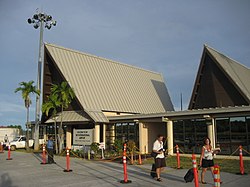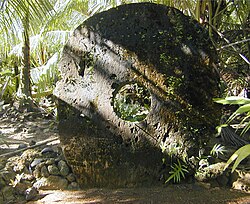Federated States of Micronesia
The Federated States of Micronesia is a country in the northwestern Pacific Ocean, composed of four major island groups just north of the equator.
Understand
[edit]Climate
[edit]Tropical; heavy year-round rainfall, especially in the eastern islands; located on southern edge of the typhoon belt with occasionally severe damage; Natural hazards are typhoons (June to December).
Terrain
[edit]The 607 islands vary geologically from high mountainous islands to low, coral atolls; there are volcanic outcroppings on Pohnpei, Kosrae, and Truk.
- Highest point: Dolohmwar (Totolom) 791 m
History
[edit]- National holiday
- Constitution Day, 10 May (1979)
- Constitution
- 10 May 1979

Austronesian seafarers settled on the islands around 2000 BC. From 1500 BC, new maritime empires emerged, including the Yapese Empire and the Saudeleur Dynasty. European explorers discovered the Carolines up until the late 19th century. In World War II, the U.S. bypassed the islands in its leapfrog campaign across the northwest Pacific.
In 1979, the Federated States of Micronesia, a UN Trust Territory under US administration, adopted a constitution. On 3 November, 1986, independence was attained under a Compact of Free Association with the US; economic provisions of the Compact are being renegotiated. Previously, the area had been colonized by the Japanese, the Germans, and the Spanish
- Independence
- 3 November, 1986 (from the US-administered UN Trusteeship)
Present concerns include large-scale unemployment, overfishing, and overdependence on US aid.
Culture
[edit]Each of the four states has its own culture and traditions, but there are also common cultural and economic bonds that are centuries old. For example, cultural similarities like the importance of the traditional extended family and clan systems can be found on all the islands. The islands are known for their stick dancing traditions.
Visitor information
[edit]Regions
[edit]There are 4 states:
Cities
[edit]Ports and harbors
[edit]Other destinations
[edit]- The remote atoll of Kapingamarangi is the southernmost island group in FSM.
- 4 Nan Madol
Get in
[edit]
Entry requirements
[edit]If you are going to be in the FSM for less than 30 days you do not need an entry permit. Anyone who will be staying longer than that needs an entry permit. For citizens of the United States, Palau, and the Marshall Islands, this entry permit lasts 1 year. For everyone else, it lasts 60 days. You can get your entry permit on arrival, but if you're traveling for a purpose other than tourism, you need to apply for it in advance.
Most people will need to prove their citizenship with a passport that has at least 120 days of remaining validity, but if you're from Palau, Marshall Islands, or the United States, you can use your birth certificate or an FSM entry permit in lieu of a passport (but a passport still works, too).
If you need to apply for an entry permit on arrival, you must present an FSM Arrival and Departure Record. This is furnished by a carrier before entering the FSM. You will need a completed application form in addition to this.
By plane
[edit]
United Airlines operates a thrice-weekly "island hopper" flight (CO956 eastbound, CO957 westbound) traveling Honolulu—Majuro—Kwajalein—Kosrae—Pohnpei—Chuuk—Guam and vice versa. The full flight is fourteen and a half hours, leaving in the early morning and terminating in the evening, with a stop of about one hour on each island. There are also nonstop flights from various islands to both Honolulu and Guam.
Honolulu is the most direct gateway into the islands from North America. Guam is the most direct gateway from most places in Asia and Australia, although it is also possible to fly into the islands from Manila via Palau.
By boat
[edit]The major international ports are; Chuuk, Pohnpei and Yap. There are inter-island trading ships based in these major ports which visit the outlying islands.
Get around
[edit]By bus
[edit]Even though there are no scheduled bus services on the island, some buses are available to hire or charter. Also, on Yap there is a school bus that runs twice daily from Colonia to the villages.
Taxi
[edit]Taxi services are available throughout the islands and are inexpensive.
Car hire
[edit]There are self-driven cars available in the major towns of the islands. However, It is required to have a National Driver's License or International Driving Permit.
Talk
[edit]- Languages
- English (official and common language), Trukese, Pohnpeian, Yapese, Kosrean, Ulithian, Woleaian, Nukuoro, Kapingamarangi
See
[edit]
Micronesia, an island nation, is full of vast pristine tropical beauty and traditional culture is very much alive, like in most of the western Pacific.
The countless islands are largely undeveloped and their sheer remoteness and Robinson Crusoe like-atmosphere are a major draw for visitors. There are gorgeous sea views all around, and the islands' scenery treats vary from beautiful beaches to lush jungles. There's world of colour under water and if you're willing to dive, there are some great opportunities to see underwater life.
The ruined city of Nan Madol on Pohnpei is a true highlight and the site of ancient rituals, politics, and royal dwellings of the Saudeleur dynasty. It's a collection of 92 man-made islets connected with tidal canals, which gained it the obvious name of Venice of the Pacific. It's a magnificent archeological attraction, covering 18km2 partly reclaimed by nature. There are huge basalt pillars and stone structures which create an image of the temples, bathing houses, vaults and pools that once formed the centre of life here for centuries.
Of later date but still quite old are the ruins of Lelu, connected with a causeway to Kosrae. Constructed in the 13th and 14th century, this was the centre of the local royalty. Today, it's the stuff of adventure movies: tucked away in thick jungle and largely overgrown. The original purpose of several of the remaining structures is known, and on-site signs help to get a good idea.
The main island of Yap is famous for its stone money, which is still used for ceremonial gifts or payments. Sometimes huge in size, these stone "coins" are a sight in itself. Stroll to the village of Balabat to see the stone money bank and keep your eyes out for traditional houses. Although available on most islands, the village Bechiyal is home to Yap's oldest faluw (or men's house). Yap is also the place to see the best of the region's indigenous arts, as it houses the excellent Ethnic Art Village.
Do
[edit]Some popular activities are:
Diving, Viewing, Traditional culture, Swimming
Buy
[edit]Money
[edit]
| Exchange rates for U.S. dollars As of January 2025:
Exchange rates fluctuate. Current rates for these and other currencies are available from XE.com |
The ancient Yapese may be known for their rai stones ("stone money"), but the official currency of the FSM nowadays is the U.S. dollar ("$", ISO currency code: USD). It is divided into 100 cents.
Eat
[edit]- Kelaguen is a traditional dish of grilled meat marinated in lemon juice, salt, and hot peppers. After grilling, it is topped with coconut and scallions.
Drink
[edit]Sleep
[edit]- 1 Kosrae Nautilus Resort, P.O. Box 135, Kosrae, Micronesia (15-minute drive from the airport on the eastern side of the island, adjacent to the ocean), ☏ +691 370 3567. Check-in: When the flight arrives, check-out: 10.30AM. 18-room modern hotel with air-conditioned rooms and restaurant, or outside dining by the swimming pool. Free airport transfers, full service scuba dive operation including NAUI scuba instruction. Tour and rental cars arranged. Located adjacent to the Lelu causeway facing east to the Pacific Ocean, with 3 acres of manicured gardens. US$115 to $130.
Work
[edit]U.S. citizens may live and work freely in Micronesia.
Stay safe
[edit]The Federated States of Micronesia is generally one of the safest countries to visit. However, there has been some reports of crime in Weno, the capital of Chuuk. Crime is certainly a problem in Weno.
Stay healthy
[edit]Don't drink the tap water.
Respect
[edit]Some islands are very traditional, especially Yap state. Be sure to respect their culture.
Connect
[edit]Cell service is available with a locally purchased (or rented) SIM card.


 Français
Français Italiano
Italiano





